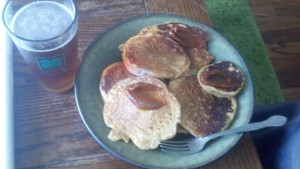During marathon season, many questions come up regarding nutrition. Today I’d like to go over some nutrition tips for marathon season, including basic nutrition, mid-run fueling, and pre-run/post-run nutrition.
It’s no secret that running a marathon is a pretty easy way to lose weight. You simply are burning thousands more calories than the person sitting on the couch. I am frequently asked about how to diet while marathon training. For most runners, this is not a smart idea. Your body and brain are put through a lot of stress during marathon training months, and depriving yourself serious calories can leave you feeling tired. You can also accidentally cut nutrition you need, leaving your body weak and unable to improve for your task at hand – 26.2 miles. Therefore, I suggest eating a sensible and well-balanced diet while training, and any extra body fat will probably disappear due to training, as long as you aren’t suddenly overeating. Instead of going on a diet, think of your body as your machine and yourself as an athlete – because you are. It doesn’t matter how fast you are going to run on race day, you are preparing your body for a marathon. Eat nutrient-dense foods. Foods that give you the fuel and nutrients you need to feel good, energized, and fueled for training. Fresh fruits and veggies, lean proteins, complex carbs and lots of water should make up most of your diet. Focus on eating well and don’t make anything off-limits.
For your long runs and race day, nutrition can be what makes or breaks your morning. Mid-run fueling can be tricky, as everyone has different sweat-rates, and everyone’s stomach and nutrition needs are different. Personally, if I am running a 3:00-3:30 marathon, I’ll consume 1 GU every 30-40 minutes (usually 4 GU per marathon), and I grab a cup of water every 20 minutes and take a few sips. For me, this is usually enough to get me through a marathon without feeling too zapped, but also not water-logged or sick. If conditions aren’t ideal, I may take more nutrition. I’ve sometimes used GU with caffeine and other times without. Whatever I end up training with most is what I go with on race day. That’s one example. The longer your out there for your race, the more fuel you’ll need. Other runners prefer Gatorade or Blocks over Gu-like products. On your training run, try to practice what you’ll do on race day. Nutrition is recommended for runs lasting about 90 minutes or more. Any runs of less time shouldn’t require mid-race fueling as long as you are hydrated pre-run and refuel after your workout is complete.
- A word about mid-run nutrition – yes, there are calories in nutrition – about 100 calories per serving. These calories are very much-needed on your long runs, so DO NOT skip them because you are watching your figure. However, if you are using GU for every run you do, even easy 3-5 milers, you may end up gaining weight. Those supplements simply aren’t necessary for short runs and are therefore empty calories.
What you eat before your long run can lend itself to a successful run – or can make you suffer. Just as you should think about your general nutrition fueling your body as an athlete, you need to be aware of what you are consuming pre-long run. You don’t need to go crazy with the carbs (your body can only store so much glycogen, and the rest will simply be wasted), but you DO want to make sure you eat simple carbs. The night before a long run, I may eat pasta, pizza, rice, or potatoes. The morning of my run, I eat a bagel or toast with a little peanut butter, a banana with oatmeal, or pancakes. Just give yourself a few hours between your meal and your run. How much time you’ll need is going to vary per person. It is also very important to be consuming water the day before and the day of your long run. Just as it takes a little time to digest and process carbs into glycogen, it takes our bodies some time to hydrate. Chugging a liter right before your run will not help you.
Post-run, it’s important to get nutrition into your system as quickly as possible. Your body, depleted of nutrition, will go into recovery-mode soon after you finish your run. Therefore, consuming something with carbs and protein and some sugar is great. You will also need to drink some water and perhaps a bottle of Gatorade. Personally, I love a tall glass of chocolate milk, a bottle of Gatorade, and a big glass of water as soon as I’m finished my long run. After that, I’ll eat a meal. Unlike some runners, my stomach is rarely a mess post-run and I always have an appetite. I’ll eat anything from a burger with fries and a beer to a big salad topped with some form of protein. Other times I’ll opt for a big plate of pancakes or a bagel with cream cheese and lox. I go with what I’m craving. If your stomach is sensitive and you don’t have an appetite, at least get water and something like chocolate milk into your system. That’s far better than nothing. Remember, in order for your legs to recover as quickly as possible, you need nutrients to do so.
Again, this is just a starting point. I could dive into the different components of endurance nutrition in a far more detailed and nerdy way, but at least you hopefully have some sort of understanding of why certain choices should and shouldn’t be made. Remember that what works for one runner may not work for the next, and so you should always use your long runs as your “dress rehearsals” for race day. Good luck, and happy running!




